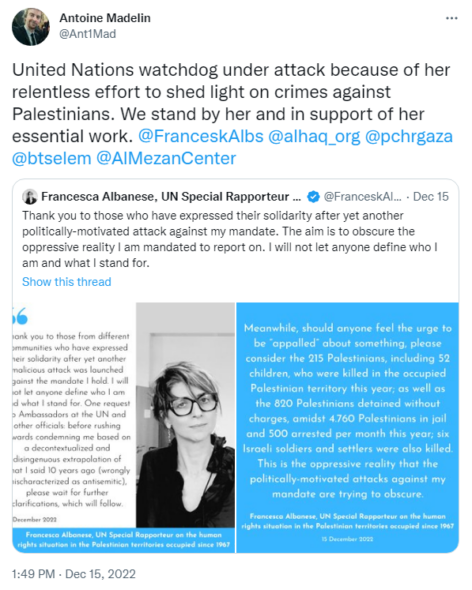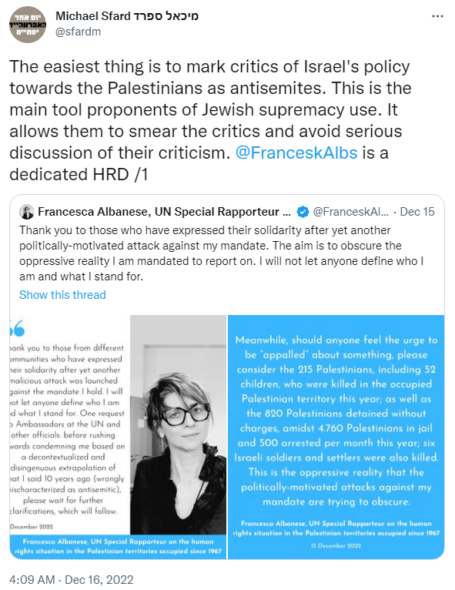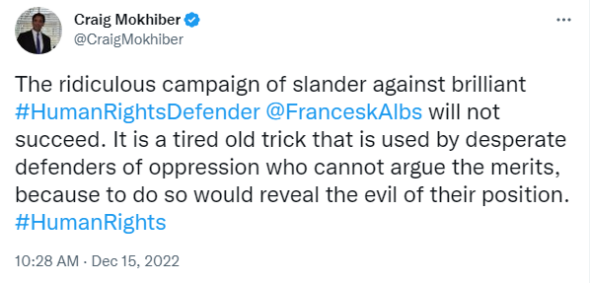A slightly different version of this article originally appeared at The Algemeiner on December 21, 2022.
Though her extreme positions and antisemitism have been known for quite a while, the latest revelations of crass antisemitism from one of the United Nations’ anti-Israel “experts” has also shed additional light on the bigger, systemic issue: the institutional antisemitism and unreliability of UN bodies and much of the broader anti-Israel industry.
Consider that of the four individuals appointed by the UN Human Rights Council to investigate the Jewish state, all four are demonstrably antisemitic.
Francesca Albanese’s conspiracy theory that the “Jewish lobby” has “subjugated” the United States is but the latest discovery in a long line of bigoted and extremist statements. Then there are the three members of the UN “Commission of Inquiry.” Miloon Kothari said the “Jewish lobby” controls social media. Chris Sidoti endorsed the dual loyalty trope and claimed that Jewish advocacy organizations are beholden to the State of Israel; he also claimed that Jews throw accusations of antisemitism around “like rice at a wedding.” The third commissioner, Navi Pillay, has built an entire career of gaslighting Jews over the explosive antisemitism they experienced at the 2001 Durban “Anti-Racism” Conference.
To point out these prejudices and biases is neither a “personal attack” nor a deflection. The UN’s own rules require that individuals appointed to such positions be selected on the basis of their personal characteristics, including impartiality, objectivity, and independence.
These rules exist for a reason. UN reports produced by individuals like Albanese typically rely heavily on subjective interpretations, judgment calls, and second-hand (or even third-hand) information. This is in part a reflection of the fact that such “experts” are charged with investigating alleged violations of vague international laws that are far from settled. So when “experts” like Albanese, Pillay, Sidoti, and Kothari concoct novel theories of international law to declare Israel is acting unlawfully, their personal integrity, expertise, and impartiality (or lack thereof) is highly relevant to determining the credibility of such legal proclamations.
The character of these individuals also matters in terms of factual claims. For example, the COI’s own terms of reference declare that “[i]n some cases, information provided by a reliable primary source may need to be corroborated by only one additional independent and reliable source, which may include the investigator’s own findings.” Also consider the fact that the source of many, if not most, of the allegations from such reports have not and will not be publicly provided. That leaves only the credibility of the commissioners themselves to vouch for the “reliability” and “independence” of the source and for the strength of the “corroborating” evidence. Notably, the same is true even for other UN institutions, such as those that provide secretive data on casualties without providing the information for outside parties to assess the accuracy or credibility of the data.
Put more simply, when the public is asked to take Albanese’s or Pillay’s word for it, then evidence of their biases and prejudices that directly relate to their mandate are obviously relevant for assessing their work output.
This leads to the obvious question: if those at the UN are so confident of Israel’s unique evil, then why, time after time, do they only appoint known anti-Israel partisans and antisemites to “investigate” Israel?
If UN actors are so sure of Israel’s crimes, then why do they consistently dispense with the UN’s own rules when it comes to its anti-Israel inquisitions?
The same could be asked of the individuals and organizations that make up much of the rest of the anti-Israel “human rights” industry. The response to Albanese’s blatant antisemitism has been not to condemn it, nor to call for a more professional, impartial investigator to ensure the integrity of what they claim are serious investigations. Rather, the response has been to recast the antisemite as the victim, and the victims as the villains. It’s the same playbook that was recently employed to defend Kanye West’s antisemitic tirades. Jews pushing back against the antisemitic conspiracy theories is just proof of Jewish trickery to hide their evil deeds.

A tweet by Antoine Madelin, the International Advocacy Director for the International Federation for Human Rights, a French non-governmental organization known for its anti-Israel advocacy.
The answer as to why these actors are so militant about appointing and defending known anti-Israel partisans and antisemites should be obvious. A fair analysis of the allegations would not produce the outcome they so desire. Whether ensuring only anti-Israel partisans are appointed to investigate Israel or crying “smear campaign” when those partisans are caught saying the quiet part out loud, these actors are invested in creating a lose-lose game for the Jewish state and the Jewish people. Rather than exercises in truth-seeking and accountability, such UN procedures are propaganda performances that make a mockery of the very idea of human rights and international law.
Yet far too many in the worlds of journalism and academia continue to treat these UN and civil society actors as reliable, notwithstanding the persistent and widespread presence of unreliable hacks and the lack of verifiability. For those fair-minded news consumers, academics, and students, understanding and sharing this context is crucial.


